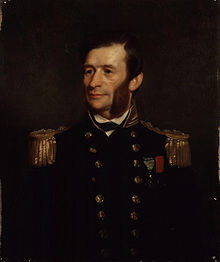Captain Richards
| Admiral Sir George Richards | |
|---|---|

Admiral Sir George Richards by Stephen Pearce
|
|
| Born |
13 January 1820 Anthony, Cornwall |
| Died | 14 November 1896 (aged 76) Bath, Somerset |
| Allegiance |
|
| Service/branch |
|
| Rank | Admiral |
| Commands held |
|
| Awards | |
Admiral Sir George Henry Richards KCB FRS (13 January 1820 – 14 November 1896) was Hydrographer to the British Admiralty from 1864 to 1874.
Richards was born in Antony, Cornwall, the son of Captain G. S. Richards, and joined the navy in 1832.
He served in the First Opium War against China, in South America, the Falkland Islands, New Zealand and Australia. Promoted to captain in 1854, from 1857 to 1864 he was in command of the two survey ships HMS Plumper and HMS Hecate.
He was the second British commissioner to the San Juan Islands Boundary Commission and a hydrographer on the coast of British Columbia in 1857-62. He is responsible for the selection and designation of dozens of placenames along the British Columbia coast. In the Vancouver area, for example, he named False Creek. In 1859, after his engineer Francis Brockton found a vein of coal, he named Brockton Point and the area of Coal Harbour. In 1860, he named Mount Garibaldi after Giuseppe Garibaldi. Other landmarks in the area named by him are the Britannia Range, and Brunswick Mountain and many features in the Howe Sound, Sunshine Coast, and Jervis Inlet areas. In 1864 he was appointed Hydrographer and held that position until 1874 when he retired.
...
Wikipedia
